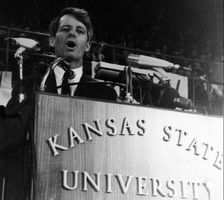
It was a pretty typical March day as I remember and certainly no bad weather to complicate things. Going to the Ahearn Fieldhouse was not new for me. I had been to most of the basketball games played there up to that time, having attended with my parents since it opened in the 1950-51 season. On that day, much to my surprise, Ahearn was jam packed, and he had the crowd with him from the very beginning of the speech. His message focused primarily on the Vietnam War and his differences with the Johnson Administration’s actions there. He admitted that, along with his brother, he had played a role in the very early actions in Vietnam. In a display of great character, he accepted responsibility for the past but also made it clear that he wanted the United States to find an appropriate exit in the future. By the time he ended, his audience would have followed him wherever he wanted to take them. It was truly amazing. After Ahearn, Kennedy went later that day to Allen Fieldhouse in Lawrence and experienced similar results, after of course sharing regards from Manhattan to the crowd at KU.
I remember talking with Dr. Jerry Marion, my dairy judging team coach, as I was leaving and how his reaction was so similar to mine. It isn’t that often that one speech can have that much impact. For me, there was only one other that could compare. At the 1976 Democratic National Convention, Congresswoman Barbara Jordan from Texas had the crowd spellbound with her powerful voice, a cadence that worked, and a message that was incredibly well-received.
Shortly after his appearance in Kansas, Kennedy was campaigning in an African American neighborhood in Indianapolis, Indiana the night Dr. Martin Luther King Jr.—who made a visit to K-State earlier that year—was assassinated. Kennedy's capacity to communicate was again tested as he had the role of sharing with the crowd the news and was able to do it in a way that did not set off similar violence to what occurred elsewhere during that difficult time.
Then, on June 5th—after winning the California Primary—Robert Kennedy was assassinated. I did not stay up to hear the final results in California but woke to the tragic news at 5:00am, as I prepared to go milk. If Bobby had lived, I believe there would have been no Watergate nor President Nixon. Bobby was very different than his older brother, President Kennedy. Bobby had deep-bedded, strong beliefs and he was passionate about getting things done. Though his presidency never came to fruition, his impact and enduring legacy remains in all those who were inspired by his message and his work. And this includes myself, as a result of one unforgettable day 50 years ago.
 RSS Feed
RSS Feed